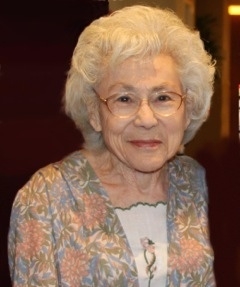New Hawthorne Scholarships Support Field Education
January 21, 2014 / by Eliza Gallo- Giving
In life, Lillian Hawthorne transformed the USC School of Social Work’s field education program by pioneering integrative seminars, professionalizing the role of liaisons, and enriching the curriculum and instructional practice, prompting other schools to follow suit.
Now, thanks to a gift from the estate of the late professor emerita, assistant dean for student affairs and alumna, Hawthorne’s legacy will continue.
Hawthorne, who died in February 2013, earned her Master of Social Work from the school in 1971, embarking on a career that earned her the Social Work Lifetime Achievement Award for Ventura County, Calif. She published three books on aging: Finishing Touches: An Insightful Look into the Mirror of Aging; Sisters and Brothers All These Years: Taking Another Look at the Longest Relationship in Your Life; and Husbands and Wives All These Years: From Caring to Caretaking. She continued to be active in social work even after her retirement from USC in 1986.
Hawthorne believed deeply in the importance of the school’s field education program, under which all MSW students must complete two internships with social service agencies, government entities, schools, hospitals or businesses, for a total of 1,000 hours of hands-on training. Two new scholarships in her name will further this mission: the Lillian Hawthorne Prize for Best Field Education Article and the Lillian Hawthorne Prize for Outstanding Contributions by a Concentration Year Student to a Field Agency.
A few years ago, the Council on Social Work Education identified field work as the signature pedagogy of social work, noted Tory Cox, assistant director of field education and clinical associate professor at the School of Social Work. Hawthorne was ahead of her time in recognizing this.
“She helped make a difference in how field education is perceived, and to fast forward 15 years and see that the council agrees with her – it’s quite a transformation,” Cox said.
As head of the School of Social Work’s field education program, Hawthorne developed a field instructor training program considered to be the best in the country, said Mary Gress, a senior clinical fellow in field education at USC who worked with Hawthorne. Before Hawthorne’s innovation, faculty members would serve as field liaisons. She moved the school to a model in which entire jobs were dedicated to placing and advising students in agencies. She also developed what are now known as field education seminars, which deliver intensive training modules to students, as well as standardized guidelines for every field placement agency.
“She pioneered stronger partnerships between agencies, instructors, the school, students and faculty, prompting other schools to do the same,” Gress said.
The $2,000 Lillian Hawthorne Prize for Best Field Education Article will be given each year to the first author – a current full-time clinical field assistant, associate or full professor, or adjunct clinical field faculty member – for a peer-reviewed journal article written and published within the 12 months before the School of Social Work Annual Merit Awards ceremony. This scholarship will help spur field faculty to seek out publication opportunities, Cox said.
The $500 Lillian Hawthorne Prize for Outstanding Contributions by a Concentration Year Student to a Field Agency will be awarded annually to a student who has made significant contributions to the programs and policies of the agency in which he or she is placed.
Both prizes will be given out for the first time in 2014, with recipients honored at the Dean’s Recognition Ceremony in April.
“Students are saying when they graduate that field is where they learn the most, and it’s the most transformative experience for them,” said Cox, who added that the benefits of the Lillian Hawthorne scholarships are tremendous. “To be part of a field department that is really pushing innovation and opening up the students’ eyes to the world is quite phenomenal.”
To reference the work of our faculty online, we ask that you directly quote their work where possible and attribute it to "FACULTY NAME, a professor in the USC Suzanne Dworak-Peck School of Social Work” (LINK: https://dworakpeck.usc.edu)
